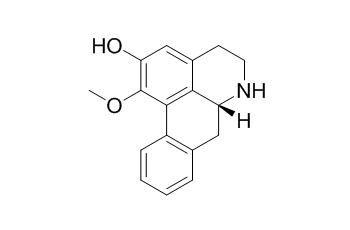Asimilobine
(-)-Asimilobine shows antioxidative, anti-acetylcholinesterase (AChE), anti-α-glucosidase, anti-leishmanial and anti-fungal activities; it displays weak inhibition against Streptococcus mutans (ATCC 25175), with a minimum inhibition concentration (MIC) of 0.25 mg/mL.
Inquire / Order:
manager@chemfaces.com
Technical Inquiries:
service@chemfaces.com
Tel:
+86-27-84237783
Fax:
+86-27-84254680
Address:
1 Building, No. 83, CheCheng Rd., Wuhan Economic and Technological Development Zone, Wuhan, Hubei 430056, PRC
Providing storage is as stated on the product vial and the vial is kept tightly sealed, the product can be stored for up to
24 months(2-8C).
Wherever possible, you should prepare and use solutions on the same day. However, if you need to make up stock solutions in advance, we recommend that you store the solution as aliquots in tightly sealed vials at -20C. Generally, these will be useable for up to two weeks. Before use, and prior to opening the vial we recommend that you allow your product to equilibrate to room temperature for at least 1 hour.
Need more advice on solubility, usage and handling? Please email to: service@chemfaces.com
The packaging of the product may have turned upside down during transportation, resulting in the natural compounds adhering to the neck or cap of the vial. take the vial out of its packaging and gently shake to let the compounds fall to the bottom of the vial. for liquid products, centrifuge at 200-500 RPM to gather the liquid at the bottom of the vial. try to avoid loss or contamination during handling.
J Cell Mol Med . 2023, jcmm.17954.
Foods.2021, 10(12):2929.
Phytother Res.2020, 34(4):788-795.
J Nat Prod.2015, 78(6):1339-4
Cell Physiol Biochem.2019, 52(6):1255-1266
J Ethnopharmacol.2019, 241:112025
J Biochem.2024, 175(3):253-263.
J Agric Food Chem.2022, 70(51):16176-16187.
J Med Food.2021, 24(2):151-160.
Molecules.2021, 26(23):7390.
Related and Featured Products
Nat Prod Res. 2017 Aug;31(16):1944-1947.
Alkaloids from aerial parts of Annona senegalensis against Streptococcus mutans.[Pubmed:
27984920]
Antimicrobial potential of medicinal plants have been explored extensively these days.
METHODS AND RESULTS:
This study was carried out to evaluate the antibacterial potential from aerial parts of plant, called 'Annona senegalensis' and its constituents. Bioassay guided fractionation led to the isolation of four metabolites, (+)-catechin (1), (-)-anonaine (2), (-)-Asimilobine (3) and (+)-nornantenine (4). This is the first report on the isolation of compounds 1, 3 and 4 from this plant. Compounds 2 and 4 showed good activity, whereas 1 and 3 displayed weak inhibition against Streptococcus mutans (ATCC 25175). The results showed that compound 2 and 3 showed significant activity with a minimum inhibition concentration (MIC) of 0.12 and 0.25 mg/mL, respectively.
CONCLUSIONS:
The present study reports for the first time the antibacterial activity of the extract of A. senegalensis and its constituents. As S. mutans is a rather resistant bacteria, the MIC obtained during the present study is significant.
Molecules. 2014 Nov 3;19(11):17829-38.
Antioxidant and anticancer aporphine alkaloids from the leaves of Nelumbo nucifera Gaertn. cv. Rosa-plena.[Pubmed:
25372397 ]
METHODS AND RESULTS:
Fifteen compounds were extracted and purified from the leaves of Nelumbo nucifera Gaertn. cv. Rosa-plena. These compounds include liriodenine (1), lysicamine (2), (-)-anonaine (3), (-)-Asimilobine (4), (-)-caaverine (5), (-)-N-methylAsimilobine (6), (-)-nuciferine (7), (-)-nornuciferine (8), (-)-roemerine (9), 7-hydroxydehydronuciferine (10) cepharadione B (11), β-sitostenone (12), stigmasta-4,22-dien-3-one (13) and two chlorophylls: pheophytin-a (14) and aristophyll-C (15). The anti-oxidation activity of the compounds was examined by antiradical scavenging, metal chelating and ferric reducing power assays. The results have shown that these compounds have antioxidative activity. The study has also examined the antiproliferation activity of the isolated compounds against human melanoma, prostate and gastric cancer cells. The results shown that 7-hydroxydehydronuciferine (10) significantly inhibited the proliferation of melanoma, prostate and gastric cancer cells.
CONCLUSIONS:
Together, these findings suggest that leaves of Nelumbo nucifera Gaertn. cv. Rosa-plena are a good resource for obtaining the biologically active substances with antioxidant properties.
Fitoterapia. 2012 Mar;83(2):298-302.
Anti-acetylcholinesterase, anti-α-glucosidase, anti-leishmanial and anti-fungal activities of chemical constituents of Beilschmiedia species.[Pubmed:
22119096]
Phytochemical investigation of Beilschmiedia alloiophylla has resulted in the isolation of one new alkaloid, 2-hydroxy-9-methoxyaporphine (1), and ten known natural products, laurotetanine (2), liriodenine (3), boldine (4), secoboldine (5), isoboldine (6), Asimilobine (7), oreobeiline (8), 6-epioreobeiline (9), β-amyrone (10), and (S)-3-methoxynordomesticine (11).
METHODS AND RESULTS:
Chemical studies on the bark of B. kunstleri afforded compounds 2 and 4 along with one bisbenzylisoquinoline alkaloid, N-dimethylphyllocryptine (12). Structures of compounds 1-12 were elucidated on the basis of spectroscopic methods. All of these isolates were evaluated for their anti-acetylcholinesterase (AChE), anti-α-glucosidase, anti-leishmanial and anti-fungal activities.
CONCLUSIONS:
Compounds 1-12 exhibited strong to moderate bioactivities in aforementioned bioassays.
Zhongguo Zhong Yao Za Zhi. 2016 Aug;41(15):2838-2842.
Studies on alkaloids from Fissistigma oldhamii.[Pubmed:
28914026]
METHODS AND RESULTS:
14 alkaloids were obtained from stems and leaves of Fissistigma oldhamii, by silica gel, ODS, Sephadex LH-20 column chromatographies, and semi-preparative HPLC. Using physicochemical and spectral methods, the isolated alkaloids were identified as norcepharadione B(1), Asimilobine(2), lanuginosine(3), laurotanine(4), isocorydine(5), anolobine(6), xylopine(7), N-methylbuxifoline(8), aristolactam AIIIa(9), piperumbellactam A(10), goniopedaline(11), aristololactam BIII(12), liriodenine(13), and salutaridine(14), respectively.
CONCLUSIONS:
Compounds 3-5, 8, 10, 11 and 14 were isolated from the genus Fissistigma for the first time.



